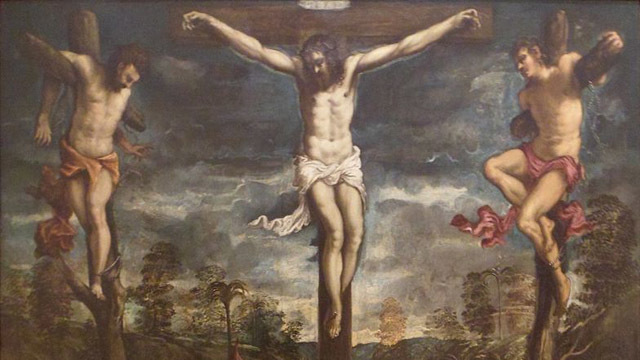In several places in the gospels, Jesus says, “The first shall be last and the last shall be first”. We could find no better illustration of this saying than the scene in today’s gospel. As Jesus hangs dying on the cross, a man hangs on a cross next to him. We know almost nothing about this man. We don’t know his name. We don’t know his age. We don’t know if he’s married or not. We don’t know if he earned his living by working with his hands or by some professional skill. The only thing we know about him is that he is the last one among us.
He is a criminal, and by his own admission, he is guilty of his crimes. When he appears in the gospel, we find him in the last hours of his life, experiencing a horrific death. Any of the good things may have done prior in his life, any of the successes he may have achieved are irrelevant now. His life is coming to a horrible and meaningless end. But it is to this man, the last one, that Jesus offers eternal life. When the man asks Jesus to remember him, Jesus says, “Today, you will be with me in paradise.”
These words of Jesus are meant to remind us that our relationship to God and our hope for eternal life do not depend on our own accomplishments or achievements. They depend only on the mercy of God, and God extends that mercy to the least and the last. It is as if God’s mercy compensates for human weakness and sin.
Now this is good news to all of us who struggle and to any of us who have failed. You might be in a situation where you watch your children cope with life. They struggle to find a job, to establish a stable and deep relationship, to find real happiness. And you say to yourself, “I could have done a better job as a parent. I should have done more of this and less than that.” But the good news is this: When the line of parents forms to enter into heaven, Jesus will welcome those at the back of the line, before he welcomes those at the beginning.
Because of advancing age or some sickness, we might find ourselves losing our abilities and energy. We are no longer able to do the things that people need us to do or the things that we want to do. Our life loses direction and we begin to question whether we are still people of value. The good news is this: when Jesus opens the doors to paradise, he will embrace the weak before he embraces the strong.
We may have been struggling for years to conquer a habit of prejudice, prejudice against someone of a different race or a different sexual orientation. But try as we might, we still discover that we are judging others the way that we always have. Or we might be struggling for years to forgive someone who has hurt us deeply. But despite our best efforts, we recognize that our heart is as hard as ever. When we see ourselves in this negative light, it’s easy to wonder, “How can I be a follower of Jesus? How can I hope for eternal life?” But the good news is this: when Jesus comes to show mercy, he begins with those who need it the most.
In the last hours of Jesus’s life, he announced who would be the first saint, who would be the first human being to share eternal happiness with him in paradise. To our surprise, it was not one of the twelve apostles or John the Baptist or even his Blessed Mother. It was a nameless criminal, dying without hope. Jesus wants to make clear that it is always and only about God’s mercy. That is why he chose the last one to be the first one to enter heaven.

